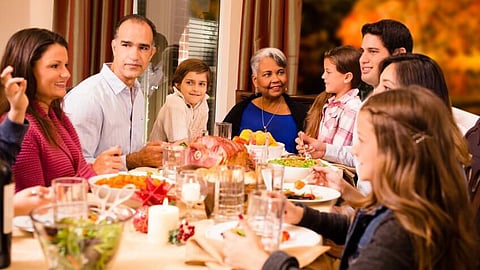Silver lining of being quarantined in Ramadan
Having a family around in the pandemic helps us raise our spiritual game

When Governor Andrew Cuomo of New York announced that lockdown would be extended , I wondered how this would affect Ramadan.
After all, dinner parties and communal prayers have long been integral to this month, which began on April 24. But rather unexpectedly, quarantine has enhanced my Ramadan experience. Being at home has made it easier to observe the holiest month and made it a richer and deeper spiritual affair.
Ramadan entails fasting daily from just before dawn until dusk - about 16-17 hours - for an entire month. As difficult as this is, I’ve never considered it to be the principal challenge of Ramadan. After a few days, you get used to not eating and drinking during the day.
We’ve tried to continue the intellectual aspect of Ramadan by turning the family iftar dinner - the evening meal where we break the fast - into a sort of book club
Far more difficult is Ramadan-induced sleep disruption. Observant Muslims rise in the small hours of the night to eat before offering the pre-dawn prayer - which marks the time the fast commences - around 3:00 a.m.
It’s always hard to get back to sleep after this breakfast and prayer before dawn, and this routine becomes increasingly exhausting as Ramadan progresses.
Freed from commuting and denied access to all that New York City has to offer, I have a lot more time to dive deeper into the Ramadan experience. Unlike in previous years, when my observation of Ramadan was mostly limited to fasting, this year I’ve found myself dedicating more time to prayer.
Since Ramadan was when the Quran was revealed to the Prophet Muhammad, I’ve challenged myself to read the entire Quran this month.
This is also the first Ramadan I’m spending with my parents and sisters since 2009. Earlier this year, my parents moved in with me from Texas to help care for my infant son.
A packaged deal
I later realised that this was part of a package deal: They insisted that my two younger 20-something sisters (who were already living in New York City) move in too.
I’m grateful that I’m able to spend this Ramadan praying with my wife, parents and sisters, as I know that many others - including friends of mine - are spending this Ramadan alone. There’s something special about praying with others, and having family around has helped to raise my spiritual game.
For example, my mother ensures that we congregate for duas every evening shortly before the end of the fast. This was a regular feature of Ramadan when I was growing up but something I had struggled to maintain as I grew older. Unlike the Quran, which is considered the word of God, duas are invocations - written by man - that extol Allah for his bounties and mercy.
Our YouTube-powered family prayer sessions entail watching a video of a slide show. On each slide is the original Arabic text of the prayer and its English translation.
The video glides through the slides as a voice-over recites the original Arabic. Reading the English translation onscreen makes the experience more meaningful and satisfying since none of us speaks Arabic.
Usually, a small part of the Ramadan experience entails listening to lectures at a mosque. This year, since mosques are closed, many of these lectures have migrated to Zoom.
However, instead of tuning in to these Zoom lectures, we’ve tried to continue the intellectual aspect of Ramadan by turning the family iftar dinner - the evening meal where we break the fast - into a sort of book club.
After breaking the fast with pistachio-infused, chocolate-topped dates, we turn to debating tales from “God Emissaries: Adam to Jesus.” This excellent book by Rizwan Arastu draws upon several sources to present a cohesive narrative of the Islamic view of many biblical figures, including prophets Adam, Noah, Abraham, Joseph, Moses and Jesus (all of whom are central figures in Islam).
Quarantine has also amplified the reflection that Ramadan is supposed to inspire. Being surrounded by family and being able to rely on a steady stream of online grocery -orders now makes me feel rather wealthy.
As I think of those who don’t have the same luxuries and those who have been negatively affected by the pandemic, I’m reminded of the wise words of Ali ibn Abu Talib, the son-in-law of Prophet Muhammad (PBUH), who said, “The nourishment of the body is food, while the nourishment of the soul is feeding others.”
Ali-Asghar Abedi is a writer based in New York
NYT







